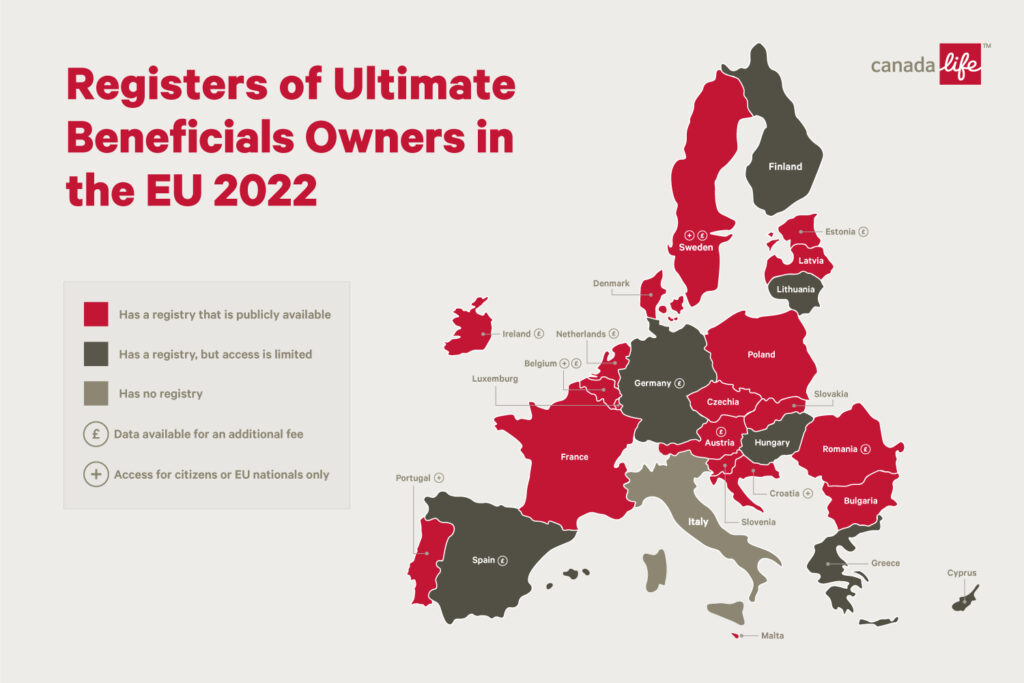I’ve previously looked at the discrepancy reporting requirements for relevant persons in respect of the Trustee Registration Service (TRS), discussed who was “relevant” for the purposes of the regulations and what that meant for advisers servicing trust business on an ongoing basis.
However, while for the majority of UK trusts, TRS will probably be our only concern, we do also need to factor in the interaction of other beneficial ownership registers, either where the trustees enter into a business relationship in an EU jurisdiction or where a trustee or other beneficial owner resides in or moves to a country in the EU, writes Stacey Love, technical manager of tax, trusts and estate planning at Canada Life UK.
The 4th and 5th AML Directives did not just impact compliance requirements in the UK. The regulations, introduced EU wide, required the implementation of a register of beneficial ownership in every EU member state, recording the beneficial ownership of (a) trusts and (b) similar legal arrangements.
The 5th Directive also specifically introduced the concept of public access to beneficial ownership information with the intention of allowing “greater scrutiny of information by civil society, including by the press or civil society organisations”.
By October 2022, 26 countries had implemented Ultimate Beneficial Owners (UBO) registers, with varying degrees of success, particularly in respect of the issue of public accessibility, as can be seen on the infographic below:

Source: Ultimate Beneficial Owners Registers in the EU 2022 by Transparent Data
Obviously, the UK does not appear on the list as it is no longer part of the EU, although TRS is a semi-public register, but only accessible to relevant authorities who investigate money laundering offences or have a suspicion of money laundering offences being committed, not the general public. In addition, beneficial owners who are considered vulnerable such as minors or individuals lacking mental capacity will not have their beneficial ownership information shared.
On the face of it, the sharing of information in this way with the general public seems to fly in the face of the principles of, and rights under, the General Data Protection Regulation, introduced across the EU in May 2018.
Indeed, in a recent ECJ judgement from November 2022, the court held that the fully public accessible nature of the UBO registers infringed the fundamental rights contained in Articles 7 and 8 of the Charter of Fundamental Rights of the European Union which cover the respect for private life and the protection of personal data.
As a result, Austria, Belgium, Cyprus, France, Germany, Ireland, Luxembourg, Malta and the Netherlands all suspended access to their Registers, although a number of countries have now switched the service back on, either restricting access to press and civil society organisations who can demonstrate a legitimate interest or, in the case of France, returning to a fully public register.
Why does this matter for a UK trust?
Let’s consider a fairly average case.
We have an express discretionary trust created by a gift of cash, where both the settlor and the majority of trustees are UK resident but one trustee resides in France. The class of discretionary beneficiaries includes French resident grandchildren of the settlor.
The trustees invest in an Isle of Man-based single premium investment bond, which is the only asset of the trust
- There is a registration requirement on TRS as a reporting only non-taxable trust;
- As there is a French resident trustee there is also a registration requirement on the French UBO. Unfortunately there is no exemption available in France for trusts already registered on TRS because the UK is no longer part of the EU;
- The IOM based life company will also submit annual CRS information to HM Revenue and Customs under Automatic Exchange of Information (AEOI) in respect of the French beneficial owner, which HMRC will then share with French tax authorities; and
- When/if a French beneficiary receives a benefit they will need to be included as a beneficial owner on the French Register unless they are a named individual from the outset in which case they are expected to be included, whether they have received a benefit or not.
The information available on the majority of UBO’s across the EU is as follows:
- First and last name
- Date of birth
- Nationality
- Home country
- Nature and extent of interest
To complicate matters further, if the single premium bond investment had been invested with a Dublin based life company, the trustees would have an additional registration requirement in Ireland under Central Register of Beneficial Ownership of Trusts (CRBOT) – because they are entering into a business relationship with a company resident in an EU jurisdiction – but the exemption would then apply from the requirement to register on the UBO in France because both countries are within the EU.
Many lay trustees have already struggled considerably with the registration requirements for TRS in the UK, without considering the compliance requirements which may also be necessary in other EU jurisdictions.
Of course, as we have already experienced with the difficulties faced by UK trustees attempting to register on the Irish based CRBOT UBO service, which remains suspended for UK trusts at this time, the mechanics of registering a UK trust on a UBO service in any of the other EU jurisdictions will no doubt be an additional challenge.
As this is the case, the appointment of a professional trustee to both administer the trust and deal with the compliance issues in the various jurisdictions starts to look very attractive, particularly where the professional is the sole appointed corporate trustee, since the trust and the beneficial owners are not then exposed to the vagaries of the fully public access registers across the EU, unless EU resident named individuals are included in the class of beneficiaries.
This article was written for International Adviser by Stacey Love, technical manager of tax, trusts and estate planning at Canada Life UK.








